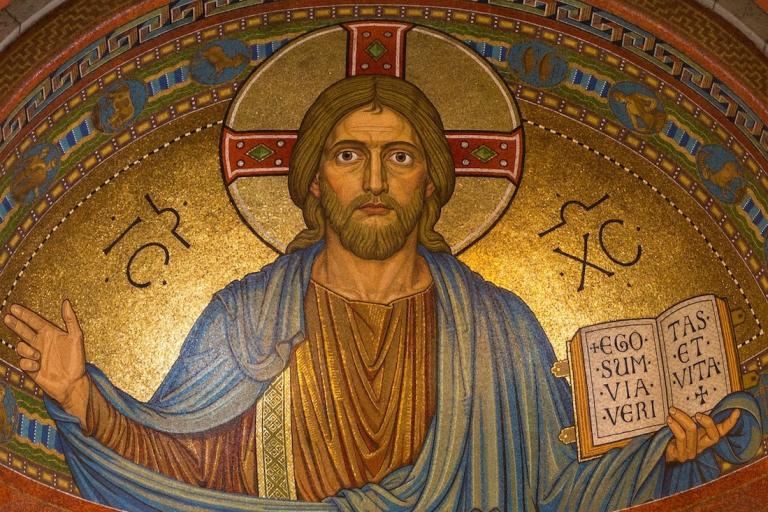What if there’s more to the story of Jesus and God than what’s found in the Bible? What if the Bible is only telling part of the story—and if you dug a little deeper you could find a rich trove of knowledge that could both better inform and enlighten you?
During a recent conversation with the Christian theologian Matthew Fox, he made a simple but profound statement: “God did not stop speaking to us after the Bible was written.” Think about that for a moment. Did God impart the knowledge found in the Bible and then suddenly stop talking? Or, as Fox believes, did God continue to speak to us throughout history, through mystics like Julian of Norwich, continuing to speak to us today?
It’s an idea that is reinforced by Elaine Pagels in her book Why Religion? A Personal Story. The religious scholar finds that “Christianity’s traditional exclusion of anything outside its boundaries is too confining.” It wasn’t always this way. In the early days of Christianity, monks played a vital role in collecting a variety of spiritual texts in monastery libraries, including the early Christian books knows as the Gnostic Gospels.
This is further evidenced in a recent study by Hugo Lundhaug, a theologist at the University of Oslo. He reports that “a far greater diversity of thought existed amongst people who considered themselves Christian than we previously thought.” Some of the Gnostic texts were reproduced and read by Christian monks into the fourth and fifth centuries. But Lundhaug tells us that “in time, as Christian thought developed, the reading of such unusual texts would have become less acceptable until finally the command came to discard them completely.”
What mattered most to early Christians was deepening their spirituality.
Pagels, who is a Professor of Religion at Princeton, is the author of the seminal book on the early Christian texts, The Gnostic Gospels. She points out that the early Christians were a much more open-minded bunch than those who followed, as they were not totally beholden to the Bible. In her words:
What mattered to these monks wasn’t dogma. They weren’t judging the value of sacred writings by whether or not they conform to Christian doctrine. They were open to exploring other traditions along with their own…apparently less concerned with what to believe than with deepening their spiritual practice.
That’s what we’ll be doing here today: exploring 3 sacred writings that were lost to time and deepening our spiritual practice. What follows are three examples from the Gnostic texts called out by Pagels. The first two provide additional enlightenment on the true message of Jesus, even though they may contradict what’s found in the Bible. The third message is more general in nature, but one we might all take to heart.
Message #1. The Kingdom of God is a Place on Earth.
Pagels points out that in the Gospel of Mark, Jesus announces that “the kingdom of God is coming soon.” But what does Jesus mean by that? Some take it to mean that a catastrophic, world-ending event will ensue, and that earth will be replaced by something closer to heaven. But the Gnostic Gospel of Thomas suggests that Jesus was merely speaking in metaphor:
Jesus says: If those who lead you say to you, “The kingdom is in the sky,” then the birds will get there first. If they say, “It is in the sea,” then the fish will get there first. Rather, the kingdom of God is within you, and outside of you. When you come to know yourselves then…you will know that you are the children of God.”
The core message: The kingdom of God is not a place in the sky, it’s actually a state of being! When we enter this state, we “come to know who we are and come to know God as the source of our being.” With this realization, we can experience the essence of God within us at the present moment, even today.
Message #2. The Light of God is Within Us.
Pagels tells us that a primary theme in Jewish mystical tradition is that the “image of God,” a divine light, is hidden deep within each of us. Our goal is to find this light which also serves to connect each of us with one another. As the Gospel of Thomas says:
Within a person of light, there is a light. If illuminated, it lights up the whole world; if not, everything is dark.
Another passage in the Gospel of Thomas suggests that in searching for this light, we can find what we’re seeking right where we are. Jesus says: “Recognize what is before your eyes and the mysteries will be revealed to you.” It’s the equivalent of having “a secret door within us” that if we open it, will reveal all that is known and all that we need to know.
This idea is expanded on in another Gnostic text titled The Revelation of Zostrianos where the author writes: “If you seek with everything you have, you shall come to know the good that is within you; and you will know yourself as one who comes from the God who truly exists.”
Message #3. We are Connected to All Beings.
The Gospel of Truth expands on the idea that “when we come to ourselves, simultaneously we come to know God.” Pagels informs us this is “not intellectual knowledge, but knowledge of the heart.” We are intimately connected with the Divine, since “in him we live and move and have our being.”
This book also talks to how we are connected “with one another and with all beings” because in each of us “dwells the light that does not fail.” Because of this connection we should:
-
Speak the truth with those who search for it.
-
Support those who have stumbled.
-
Extend your hand to those who are ill.
-
Feed those who are hungry.
-
Give rest to the weary.
-
Strengthen those who wish to rise.
-
Awaken those who are asleep.














